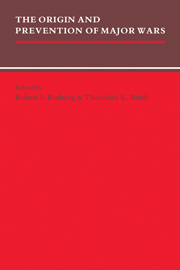Book contents
War and Misperception
Published online by Cambridge University Press: 02 December 2009
Summary
War has so many causes—in part because there are so many kinds of wars—and misperception has so many effects—again in part because there are so many kinds of misperceptions—that it is not possible to draw any definitive conclusions about the impact of misperception on war. But we can address some conceptual and methodological problems, note several patterns, and try to see how misperceptions might lead to World War III. In this article, I use the term misperception broadly, to include inaccurate inferences, miscalculations of consequences, and misjudgments about how others will react to one's policies.
Although war can occur even when both sides see each other accurately, misperception often plays a large role. Particularly interesting are judgments and misjudgments of another state's intentions. Both overestimates and underestimates of hostility have led to war in the past, and much of the current debate about policy toward the Soviet Union revolves around different judgments about how that country would respond to American policies that were either firm or conciliatory. Since statesmen know that a war between the United States and the Soviet Union would be incredibly destructive, however, it is hard to see how errors of judgment, even errors like those that have led to past wars, could have the same effect today. But perceptual dynamics could cause statesmen to see policies as safe when they actually were very dangerous or, in the final stages of deep conflict, to see war as inevitable and therefore to see striking first as the only way to limit destruction.
- Type
- Chapter
- Information
- The Origin and Prevention of Major Wars , pp. 101 - 126Publisher: Cambridge University PressPrint publication year: 1989

